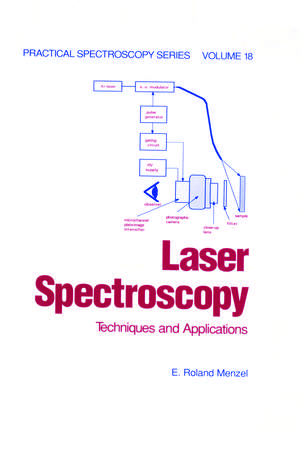Laser Spectroscopy: Techniques and Applications: Practical Spectroscopy
Autor E. Roland Menzelen Limba Engleză Hardback – sep 1994
Preț: 1406.88 lei
Preț vechi: 1895.50 lei
-26% Nou
Puncte Express: 2110
Preț estimativ în valută:
269.20€ • 281.07$ • 222.80£
269.20€ • 281.07$ • 222.80£
Comandă specială
Livrare economică 15-29 martie
Doresc să fiu notificat când acest titlu va fi disponibil:
Se trimite...
Preluare comenzi: 021 569.72.76
Specificații
ISBN-13: 9780824792657
ISBN-10: 0824792653
Pagini: 320
Dimensiuni: 210 x 280 x 20 mm
Greutate: 0.59 kg
Ediția:1
Editura: CRC Press
Colecția CRC Press
Seria Practical Spectroscopy
Locul publicării:Boca Raton, United States
ISBN-10: 0824792653
Pagini: 320
Dimensiuni: 210 x 280 x 20 mm
Greutate: 0.59 kg
Ediția:1
Editura: CRC Press
Colecția CRC Press
Seria Practical Spectroscopy
Locul publicării:Boca Raton, United States
Public țintă
Academic and PostgraduateCuprins
Interaction of light with molecules - an overview; components of spectroscopic instrumentation; adsorption-based laser spectroscopy; photoluminescence intensity-based laser spectroscopy; photoluminescence life-time-based laser spectroscopy; laser Raman spectroscopy; selected applications of laser spectroscopy; selected spectroscopic techniques; lasers and emerging spectroscopies.
Recenzii
". . .presents[s] a collection of interesting applications for laser spectroscopy with a particular concentration on unusual applications. There are nearly 100 examples described. . . .of most interest to chemists, but there is much in [the book] that applies to physicists and engineers as well. "
---Journal of the American Chemical Society
---Journal of the American Chemical Society
Descriere
This work describes experimental techniques using laser spectroscopy and presents specific practical applications for this technology in many fields, including physics, engineering, chemistry, medicine and bioscience. The general spectroscopic features of molecules are delineated; transition metal and rare earth complexes are examined; and transition selection rules are explained.









